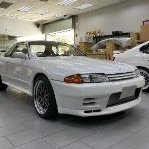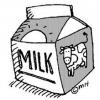Grinding Cluch
Announcements
-
Similar Content
-
Latest Posts
-
Lucky man, who owns it in the family? Any pics?
-
The engine stuff is Greg Autism to the Max. I contacted Tony Mamo previously from AFR who went off to make his own company to further refine AFR heads. He is a wizard in US LS world. Pretty much the best person on earth who will sell you things he's done weird wizard magic to. The cam spec is not too different. I have a 232/234 .600/603 lift, 114LSA cam currently. The new one is 227/233 .638 .634. The 1.8 ratio roller rockers will effectively push this cam into the ~.670 range. These also get Mamo'ified to be drilled out and tapped to use a 10mm bolt over an 8mm for better stability. This is what lead to the cam being specced. The plan is to run it to 6800. (6600 currently). The Johnson lifters are to maintain proper lift at heavy use which is something the LS7's supposedly fail at and lose a bit of pressure, robbing you of lift at higher RPM. Hollow stem valves for better, well everything, Valve train control. I dunno. Hollow is better. The valves are also not on a standard valve angle. Compression ratio is going from 10.6 to 11.3. The cam is smaller, but also not really... The cam was specced when I generated a chart where I counted the frames of a lap video I had and noted how much of the time in % I spent at what RPM while on track at Sandown. The current cam/heads are a bit mismatched, the standard LS1 heads are the restriction to power, which is why everyone CNC's them to get a pretty solid improvement. Most of the difference between LS1->LS2->LS3 is really just better stock heads. The current cam is falling over about 600rpm earlier than it 'should' given the rest of my current setup. CNC'ing heads closes the gap with regards to heads. Aftermarket heads eliminate the gap and go further. The MMS heads go even further than that, and the heads I have in the box could quite easily be bolted to a 7.0 427ci or 454 and not be any restriction at all. Tony Mamo previously worked with AFR, designed new heads from scratch then eventually founded his own business. There he takes the AFR items and performs further wizardry, CNC'ing them and then manually porting the result. He also ports the FAST102 composite manifold: Before and after There's also an improved racing crank scraper and windage tray. Helps to keep oil in the pan. Supposedly gains 2% power. Tony also ports Melling oil pumps, so you get more oil pressure down low at idle, and the same as what you want up top thanks to a suitable relief spring. There's also the timing chain kit with a Torrington bearing to make sure the cam doesn't have any thrust. Yes I'll post a before and after when it all eventually goes together. It'll probably make 2kw more than a setup that would be $15,000 cheaper :p
-
Because the cars wheels are on blocks, you slide under the car. Pretty much all the bolts you touched should have been put in, but not fully torque up. Back them off a turn or two, and then tighten them up from under the car with the wheels sitting on the blocks holding car up in the air.
-
Yes. Imagine you have the car on the ground, and you mine away all the ground under and around it, except for the area directly under each individual wheel. That's exactly how it'd look, except the ground will be what ever you make the bit under each wheel from
-
Yes, if you set the "height" right so that it's basically where it would be when sitting on the wheel. It's actually exactly how I tighten bolts that need to be done that way. However....urethane bushes do NOT need to be done that way. The bush slides on both the inner and outer. It's only rubber bushes that are bonded to the outer that need to be clamped to the crush tube in the "home" position. And my car is so full of sphericals now that I have very few that I need to do properly and I sometimes forget and have to go back and fix it afterwards!
-







Recommended Posts
Create an account or sign in to comment
You need to be a member in order to leave a comment
Create an account
Sign up for a new account in our community. It's easy!
Register a new accountSign in
Already have an account? Sign in here.
Sign In Now